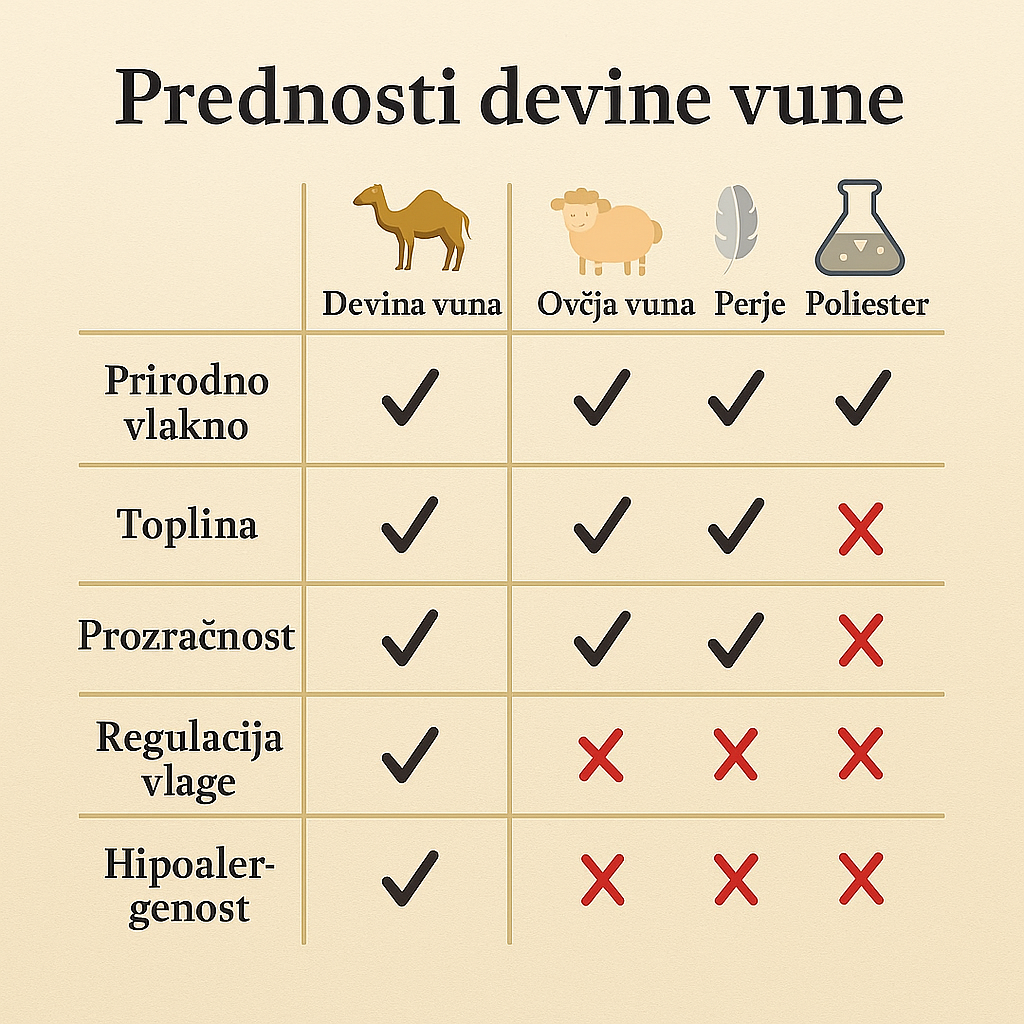
Types of duvets - which is the right choice for you?
Share
The fight for the perfect sleep: A detailed comparison of duvets
Camel's wool vs. sheep's wool vs. feathers vs. polyester!
Sleep is the foundation of our health and well-being. The quality of sleep directly affects our energy, mood, and productivity. And one of the key factors for a good night's sleep is – the right duvet.
There are a plethora of options on the market today, from traditional to modern. To help you choose the ideal duvet that will accompany you through all seasons and provide you with optimal rest, we will compare in detail the four most popular fillings: camel wool, sheep wool, feathers and polyester. We put special emphasis on the unique advantages of camel wool duvets, which are increasingly winning the hearts of lovers of quality sleep.
1. Camel Wool Duvets : The Luxury of Nature for a Perfect Sleep
Camel wool is a relatively new player in the bedding market, but it is quickly gaining a reputation for its extraordinary properties. It is obtained from the Bactrian camel, which lives in extreme climates, where temperatures range from -40°C in winter to +50°C in summer. It is this ability to adapt that makes its wool exceptionally thermoregulatory.
Advantages:
* Thermoregulation : This is the biggest advantage of camel wool. It keeps you warm in winter without overheating, and cools you in summer and provides breathability. Camel wool fibers have a hollow core that allows for exceptional air circulation, wicking excess moisture and heat away from the body. This means less sweating and a more restful sleep all year round.
* Exceptional breathability : Due to its structure, camel wool is extremely breathable, which reduces moisture under the duvet and creates a fresh sleeping environment.
* Hypoallergenic properties : It is naturally resistant to dust mites and mold. The lanolin (fat) found in sheep's wool, to which some people are allergic, is present in minimal amounts or not at all in camel wool. This makes it an ideal choice for allergy sufferers and asthmatics.
* Lightweight yet warm : Despite their ability to retain heat, camel wool duvets are surprisingly light and do not weigh down the body, providing a feeling of airy comfort.
* High moisture absorption : It is able to absorb up to 30% of its weight in moisture without feeling damp, and quickly releases moisture back into the air, maintaining a dry environment.
* Durability and resistance : Camel wool fibers are very strong and resistant to wear, which ensures the longevity of the duvet with proper care.
* Eco-friendly : The wool is collected through the natural shedding of camels, which is a sustainable and ethical process.
Disadvantages:
* Higher price: Due to the rarity of the material and the complexity of processing, camel wool duvets are usually more expensive than other options.
* More demanding maintenance: Usually require dry cleaning or very gentle hand washing.

2. Sheep wool quilts: A natural classic with tradition
Sheep wool has been the choice for quilts for centuries due to its availability and warmth.
Advantages:
* Good insulation : It is an excellent heat insulator, providing comfortable warmth during the cold months.
* Moisture absorption : Like camel wool, it can absorb a significant amount of moisture, helping to regulate body temperature.
* Natural material : It is renewable and biodegradable.
* Durability : Fibers are naturally resilient and can last a long time with proper care.
Disadvantages:
* Potential allergies : Lanolin, a natural fat in sheep's wool, can cause allergic reactions in some people.
* Weight and volume : Sheep wool quilts are often heavier and more voluminous than camel wool quilts.
* Less breathable : Although it absorbs moisture, it is less breathable than camel wool, which can lead to overheating in the summer.
* Maintenance : Requires frequent dry cleaning.

3. Feather and Down Duvets: Traditional Softness
Feathers and down (down) are traditional filling materials for duvets, known for their softness and lightness. Down (the fluff beneath the feathers) is more prized because it offers better insulation and breathability.
Advantages:
* Exceptional softness and light weight : Down duvets are incredibly soft and light, providing a feeling of "cloud" comfort.
* Good insulation : Down creates air pockets that are excellent heat insulators.
* Durability : A quality feather/down duvet can last for decades with proper care.
Disadvantages:
* Allergenicity : The main disadvantage is potential allergies to feathers or dust mites that easily settle in feather fillings.
* Weaker thermoregulation : Even though it warms, overheating and sweating may occur, because the wool wicks away moisture less well.
* Maintenance : They require professional cleaning and can be sensitive to moisture.
* Ethical issues : For some consumers there are ethical dilemmas related to the origin of feathers (animal welfare).

4. Polyester quilts: available and cheap but unnatural option
Polyester (synthetic fiber) is the most common and affordable material for filling duvets.
Advantages:
* Affordable price : By far the cheapest option on the market.
* Hypoallergenic : Synthetic material does not cause fiber allergies and does not attract dust mites to the same extent as natural materials (although it still requires regular washing).
* Easy maintenance : Most polyester duvets can be washed in the washing machine and dried in the dryer.
* Light weight : They can be very light.
Disadvantages:
* Poor breathability and thermoregulation : The main disadvantage: polyester does not "breathe", which can lead to moisture accumulation, overheating and sweating, creating an uncomfortable sleeping environment.
* Less durability : Over time, the fibers can compact, lose volume and insulating properties, and the duvet becomes less comfortable.
* Less comfort : They do not adapt to the body like natural materials.
* Not environmentally friendly : Synthetic material, non-biodegradable and derived from petroleum.

Conclusion: Investing in quality sleep
When choosing a duvet, consider your individual needs, preferences, and budget.
* If price is your primary factor, polyester is the most affordable option, but be prepared to compromise on comfort and breathability.
* If you value traditional softness and lightness, feathers/down can be a good choice, but be aware of potential allergies and maintenance.
* Sheep wool offers good natural warmth, but can be heavier and less breathable than camel wool.
However, if you are looking for ultimate comfort, exceptional thermoregulation for all seasons, hypoallergenic properties and a long-term investment in healthy sleep, a camel wool duvet stands out as the clear winner. Although the initial investment is higher, the benefits it brings to the quality of your sleep and long-term durability make it a cost-effective choice for anyone who wants the best for their vacation.
Choose wisely and indulge in the benefits of perfect sleep!

